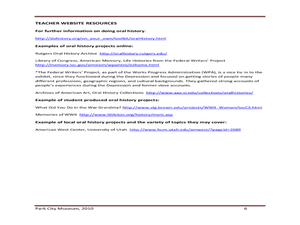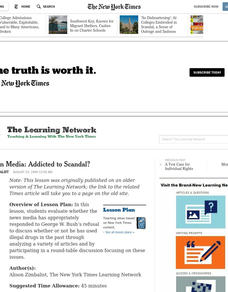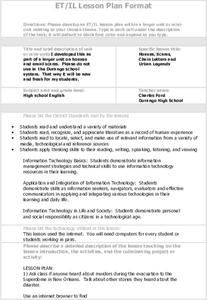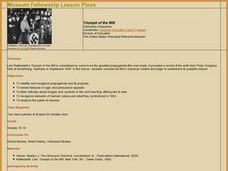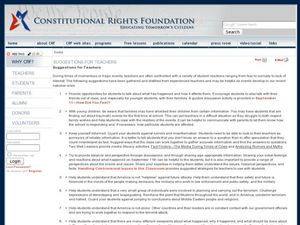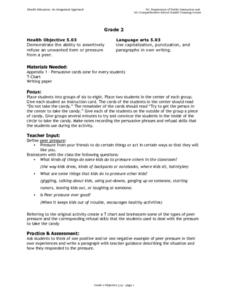Anti-Defamation League
Gossip, Rumors and Identity
A thoughtful discussion prompts middle schoolers to reflect on gossip and rumors, what they are, their experience with them, and how some groups experience it more than others. Scenarios challenge participants to consider the impact of...
Curated OER
ANALYZING RUMORS AND MYTHS
Eleventh graders explore the phenomenon of "disinformation" that often circulates during a crisis. In this American Government lesson, 11th graders analyze an article on myths and rumors.
Curated OER
The Grapevine-Teaching Storytelling to English Language Learners
Students participate in a game designed to aid in storytelling. They spread a rumor to each member of their team using information found in the accompanying worksheets. Students earn points when they report their rumor correctly. ...
Facing History and Ourselves
Confirmation and Other Biases
As the investigation into the reporting of the events in Ferguson, Missouri, continues, class members consider how bias influences perception, how the tendency is to collect evidence that supports preconceived notions. The big idea...
Curated OER
Arctica - An Interactive Mystery
Rumours of illness, poisoning, and madness - a ship disappears without a trace! Read this interactive science story and use deductive reasoning skills to solve a mystery. This engaging resource gives science stars a chance to practice...
Curated OER
Oral History: Park City Museum
Bring U.S. history to your language arts class with this lesson. Middle schoolers complete an interview for an oral history project, and discuss the importance of oral histories - and how they embellish written accounts. They write...
Curated OER
American Media: Addicted to Scandal?
Young scholars examine media coverage of George W. Bush's refusal to answer questions regarding past illegal drug usage in the 1999 campaign. They consider the role of rumor, scandal, audience and relevance in political media coverage.
Curated OER
Talking Trash - Online Message Boards
Young scholars consider their own experiences with online message boards and chat rooms, discover how teens are using the Web to talk about people in their lives, discuss the issues surrounding online conversations.
Curated OER
Health Grade 5
Fifth graders understand conflict and how to solve them. In this lesson plan about conflict resolution, 5th graders explore different factors that cause conflict. Students are put into groups and develop a list of examples for a specific...
Penguin Books
Core Curriculum Lesson Plans for The Lions of Little Rock
Schools in the 1950s and 60s looked very different from the schools we know today. An educator's guide explores the civil rights movement and, specifically, the process of integrating schools. Questions cover key themes in the novel and...
Curated OER
Hoaxes, Scams, Chain Letters and Urban Legends
Students explore the evacuation of New Orleans due to Hurricane Katrina. Using the internet, they research stories they may have heard and verify a story's authenticity. Students discuss rumors and urban legends. Given a worksheet,...
Curated OER
Forming relationships
Students are asked: How can rumors affect possible relationships?, How can a celebrity romance help the careers of those involved?, and Are celebrity relationships doomed from the start? Students are then divided into groups to see if...
Curated OER
America Responds to Terrorism
Students discuss truths and myths dealing with the subject of terrorism.
Curated OER
HIV/AIDS: Rights and Responsibilities
Eighth graders read and discuss various situations revolving around the subject of HIV/AIDS. They practice applying knowledge, solving problems, and identifying feelings around the issue of HIV. They also discuss correct condom use.
Curated OER
Planting Seeds of Philanthropy
Students explore the importance of maintaining a democracy through philanthropic actions. In this character education lesson, students discover what the Japanese internment camps were, and why they were an infringement on personal...
Curated OER
Resolving Conflicts
Students practice conflict resolution skills. In this personal health lesson plan, students share incidents of verbal harassment, exclusion, gossip, and unwanted physical contact. Students discuss how to handle the situations and role...
Curated OER
The Crucible
Students explore the historical drama, "The Crucible" by Arthur Miller looking for examples of society's mistrust of nonconformity and the injustice that can as a result of fear.
Curated OER
Triumph of the Will
Students view the propaganda film, "Triumph of the Will". Identifying propaganda techniques used, they review any fallacies in logic or persuasive appeals. They discover elements in German culture and their meaning in 1934. They...
Curated OER
Suggestions for Teachers: National Crisis
Students participate in group discussions in the face of national crises. In this coping strategies instructional activity, students openly discuss their feelings regarding traumatic events. Eleven suggestions for leading discussions...
Curated OER
The GED Test: Who Passed?
Students examine the importance of reading with understanding in order to pass the GED. In this literacy instructional activity, students discuss how important reading for understanding is in order for them to pass the GED. Students also...
Curated OER
Response to War
Students consider responses to war. In this Iraq War instructional activity, students listen to their instructor present positive methods of responding to war.
Curated OER
Health Education: Peer Pressure
Second graders examine peer pressure. For this health lesson plan, 2nd graders demonstrate the ability to assertively refuse an unwanted item or pressure from a peer.
Curated OER
Don't Just Stand By
Students discuss what it means to be a bystander to bullying and why it is difficult to help and support friends who are being affected by bullying. They brainstorm ways to overcome these challenges and are provided with strategies for...
Curated OER
What is Bullying?
Students brainstorm ideas or create a definition of what bullying is. They write their ideas on the board. They then break into cooperative groups giving each group a form of bullying from a list and discussing it among themselves.





